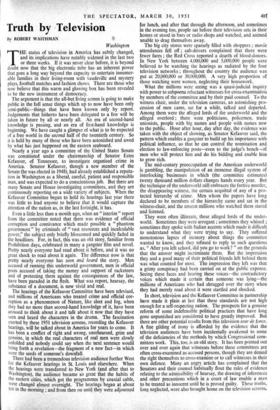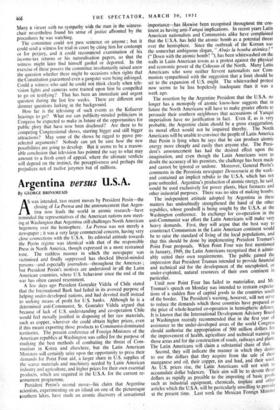Truth by Television
Washington THE status of television in America has subtly changed, and its implications have notably widened in the last two or three weeks. If it was never clear before, it is beyond doubt now that the big electronic tube has an inherent power that goes a long way beyond the capacity to entertain innumer- able families in their living-room with vaudeville and mystery plays, football matches and fashion shows. There are those who now believe that this warm and glowing box has been revealed to be the new instrument of democracy. The argument is that the all-but living screen is going to make public in the full sense things which up to now have been only semi-public—things that have been known only by report. Judgements that hitherto have been delegated to a few will be taken in future by all or nearly all. An era of second-hand knowledge is passing, and an era of first-hand knowledge is beginning. We have caught a glimpse of what is to be expected of a free world in the second half of the twentieth century. So it is held by many of those who have been astonished and awed by what has just happened on the eastern seaboard. Nearly a year ago a committee of the United States Senate was constituted under the chairmanship of Senator Estes Kefauver. of Tennessee, to investigate organised crime in America. Senator Kefauver, though a new member of the Senate (he was elected in 1948), had already established a reputa- tion in Washington as a liberal, careful, patient and responsible man, and was expected to do a conscientious job. But there are many Senate and House investigating committees, and they are continuously reporting on a wide variety of subjects. When the Kefauver Committee began to hold its hearings last year there was little to lead anyone to believe that it would capture the attention of the nation as, in the last fortnight, it has.
Even a little less than a month ago, when an " interim " report from the committee noted that there was evidence of official corruption and connivance which made possible a " phantom government " by criminals of ." vast resources and incalculable power," the subject only briefly blossomed and quickly faded in the headlines. For, in fact, this was an old story, familiar from Prohibition days, celebrated in -many a gangster film and novel. Pretty nearly everyone had read about it before, and it was no great shock to read about it again. The difference now is that pretty nearly everyone has seen and heard the story. Men accused of running this underworld government, men in official posts accused of taking the money and support. of racketeers and of protecting them against the consequences of the law, have been paraded in the flesh. What was report, hearsay, the substance of a document, is now vivid and real.
The hearings of the Kefauver Committee have been televised, and millions of Americans who treated crime and official cor- ruption as a phenomenon of Nature, like sleet and fog, when they had no more than second-hand knowledge of it, have been aroused to think about it and talk about it now that they have seen and heard the characters in the drama. The fascination exerted by these 1951 television screens, recording the Kefauver hearings, will be talked about in America for years to come. It has been a conflict of right and wrong, unrehearsed, grim and genuine, in which the real characters of real men were slowly unfolded and nobody could say when the next sentence would bring forth a revelation—the fragment of a new fact—in which were the seeds of someone's downfall.
There had been a tremendous television audience further West for the Kefauver hearings in St. Louis and elsewhere. When the hearings were transferred to New York (and after that to Washington), the audience became so great that the habits of the eastern cities, which got the programmes by coaxial cable, were changed almost overnight. The hearings began at about ten in the morning ; and from then on until they were adjourned for lunch, and after that through the afternoon, and sometimes in the evening too, people sat before their television sets in their homes or stood in bars or radio shops and watched, and seemed unable to drag themselves away.
The big city stores were sparsely filled with shoppers ; movie attendances fell off ; cab-drivers complained that there were fewer fares ; the Red Cross reported a dearth of blood-donors. In New York between 4,000,000 and 5,000,000 people were believed to be watching the hearings as radiated by the four television networks ; throughout the country the audience was put at 20,000,000 or 30,000,000. A very high proportion of those watching were women, neglecting their housework.
What the millions were seeing was a quasi-judicial inquiry with power to subpoena reluctant witnesses for cross-examination by members of the committee and by their paid counsel. To the witness chair, under the television cameras, an astonishing pro- cession of men came, sat for a while, talked and departed. Among them were the alleged lords of the underworld and the alleged overlord ; there were politicians, policemen, trade unionists, people with big names and people with names new to the public. Hour after hour, day after day, the evidence was taken with the object of showing, as Senator Kefauver said, the pattern which enables a gangster to build up his importance with political influence, so that he can control the nomination and election to law-enforcing posts—even to the judge's bench--rof men who will protect him and do his bidding and enable him to grow rich.
The mid-century preoccupation of the American underworld is gambling, the manipulation of an immense illegal system of interlocking businesses in which (the committee estimates) twenty thousand million dollars changes bands every year. But the technique of the underworld still embraces the furtive murder, the disappearing witness, the certain acquittal of any of a pro- tected hierarchy of crime. Men whom the papers have long declared to be members of the hierarchy came and sat in the witness-chair, and the unseen millions who watched them stared and listened.
They were often illiterate, these alleged lords of the under- world. Sometimes they were arrogant ; sometimes they whined ; sometimes they spoke with Italian accents which made it difficult to understand what they were trying to say. They suffered monotonous lapses of memory about things the committee wanted to know, and they refused to reply to such questions as, " After you left school, did you go to work? " on the grounds that the answer might incriminate them. But the impression they and a good many of their political friends left behind them was what counted for most. The impression they left was that a grimy conspiracy had been carried on at the public expense. Seeing these faces and hearing these voices—the contradictory voices which made it certain that someone was lying—the millions of Americans who had shrugged over the story when they had merely read about it were startled and shocked.
In short, television and the Kefauver Committee in partnership have made it plain at last that these standards are not high enough for a self-respecting nation. The prospects for a genuine reform of some indefensible political practices that have long gone unpunished are considered to have greatly improved. But there are other potential results from this television tour de force. A fine gilding of irony is afforded by the evidence that the television audiences have been incidentally awakened to some of the deficiencies of the methods by which Congressional com- mittees work. This, too, is an old story. It has been pointed out over and over again that witnesses before these committees are often cross-examined as accused persons, though they are denied the right themselves to cross-examine or to call witnesses in their own defence. Many an angry article has complained that the Senators and their counsel habitually flout the rules of evidence relating to the admissibility of hearsay, the drawing of inferences and other precautions which in a court of law enable a man to be treated as innocent until he is proved guilty. These truths, long neglected, were also brought home on the television screens, Many a viewer with no sympathy with the man in the witness- chair nevertheless found his sense of justice affronted by the procedures he was watching. The committee could not pass sentence on anyone ; but it could send a witness for trial in court by citing him for contempt or for perjury, and it could recommend examination of his income-tax returns or his naturalisation papers, so that the witness might later find himself gaoled or deported. In the exercise of these powers the committee involuntarily raised anew the question whether there might be occasions when rights that the Constitution guaranteed even a gangster were being infringed. Could a witness who said he could not think clearly when tele- vision lights and cameras were trained upon him be compelled to go on testifying? That has been an immediate and urgent question during the last few weeks. There are different and dimmer questions lurking in the background.
How far is the televising of such events as the Kefauver hearings to go? What use can publicity-minded politicians in Congress be expected to make in future of the opportunities for public glory that have now been disclosed? Are there to be competing Congressional shows, starring bigger and still bigger attractions? May some of the shows be rigged to prove pre- selected arguments? Nobody can yet be sure howl the new possibilities are going to develop. But it seems to be a reason- able conclusion that television has pointed the way to what may amount to a fresh court of appeal, where the ultimate verdicts will depend on the instinct, the perceptiveness and perhaps the prejudices not of twelve jurymen but of millions.































 Previous page
Previous page